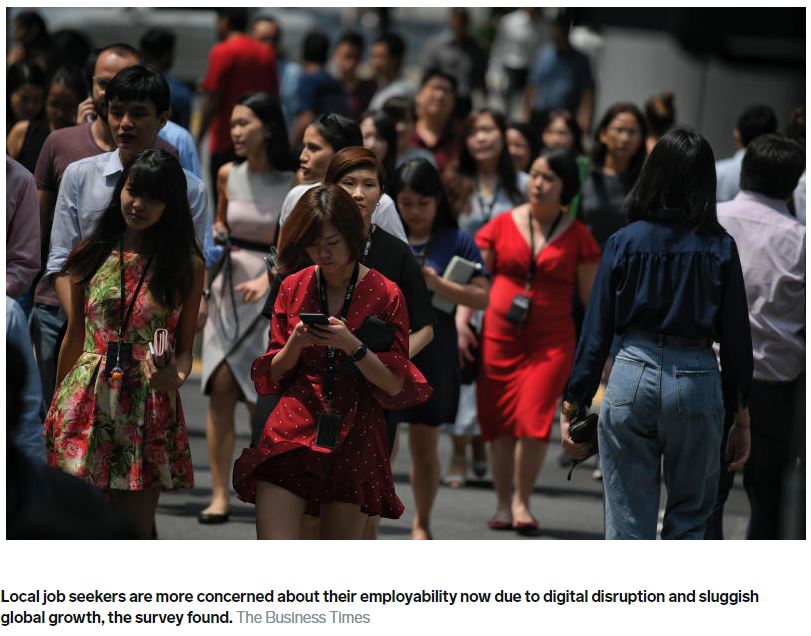Singapore workers now prioritise job security over career development – and Gen Zs prefer exciting careers over high pay
Singapore’s job seekers have spoken.
Amid global uncertainties, job security has edged out career development to become one of the the most important considerations that affects job seekers’ decisions, according to survey results released by Jobstreet.com on Wednesday (Oct 23).
The survey of 7,188 job seekers across 20 industries in Singapore found that 11.4 per cent of job security is a top consideration for job seekers. The only two more important considerations were compensation (16.6 per cent) and work-life balance (13.7 per cent).
Deciding factors that were once considered most important in a job offer – future prospects, employee benefits, management and culture of the organisations – are now becoming less important, the survey found.
Conducted in April and May, the survey also found that Singapore’s job seekers are more concerned about their employability now due to digital disruption and sluggish global growth.
Respondents were also keener on permanent roles across all industries, and about 33 per cent would decline a job offer if its on a part-time or contract basis.
Additionally, 44 per cent of respondents would prefer to work in an established and financially secure company.
While respondents from all generations were concerned about job security, Generation X (12.6 per cent) and baby boomer (12 per cent) job seekers were the most concerned. Generation Y (9.9 per cent) and Generation Z (10.2 per cent) job seekers were comparatively less concerned.
Gen Z refers to people aged between 18 and 23 years old, and Gen Y – otherwise known as millennials – refers to those that fall under the 24 to 34-year age group. Gen X are between 35 to 54 years old and baby boomers are between the age range of 55 to 64 years old.
Work-life balance still a key driver
Respondents across generations also prioritised work-life balance over job security, JobStreet said.
According to the survey, more than half believe that a five-day work week and being entitled to a sufficient number of paid holidays are essential to achieving work-life balance.
Over one in four respondents disliked shift work, and indicated that they would not even consider the offer if irregular hours were a requirement.
When it came to leave entitlement, the report found that respondents ideally wanted 18 to 19 days of annual leave. They also preferred to work in disperse-all annual leave distribution models as compared to one that allows leave entitlement to be earned over time.
As for respondents who held senior management roles in their companies, results showed that 32.7 per cent considered overtime work compensation a “must”.

- In addition, 29 per cent wanted regular daytime working hours and 19.1 per cent cited a need for flexible working hours. Jobstreet.com
Chew Siew Mee, country manager of Jobstreet.com Singapore, said in a statement that senior management members are “the ones who shoulder heavy job responsibilities and work around the clock”, but this group of employees are “usually exempted from overtime compensation”.
“What this survey has revealed is that companies must make sure to reward employees – no matter their job positions – for work done outside of official hours,” she added.
Jobstreet also found that job seekers in the education/training and medical/healthcare sectors were also more concerned over work-life balance – with respondents in these sectors ranking work-life balance as their number one job consideration.

- Coincidentally, these are the sectors that are set to expand, with a projected 2.2 per cent growth as shown by statistics from the Ministry of Trade and Industry. Jobstreet.com
Money still talks
Unsurprisingly, employees in Singapore still see attractive salaries as the most important criterion – with over 16.6 per cent ranking it as their top consideration.
According to JobStreet, respondents working in retail and merchandise (26.6 per cent); food and beverage (26.1 per cent); and advertising and media (25.7 per cent) industries have higher expectations for salary increments.
Gen Z: Exciting opportunities over money
However, salary prioritisation does not translate across all generations. Gen Z respondents are willing to trade salary and compensation for “exciting career development opportunities, modern working environments and companies that are socially responsible”, JobStreet said.
As compared to the general market, Gen Z respondents were also found to be more responsive towards contract, part-time and project work when looking for a job.
They are also more eager for overseas employment opportunities and training opportunities, and are drawn towards smart offices with the latest technology.
According to Chew, a one-size fits all human resource strategy will no longer work for employers. Hirers must find and embrace the “different behaviours and expectations of every candidate” and derive HR strategies that align with their “differing priorities” in order to “keep talents passionate and engaged”, she said.
JobStreet also said hirers should not overlook basic motivators such as career development opportunities, quality of management and leadership, having respectful and collaborative co-workers and positive work cultures. All these are “factors that are consistently among the most important that job seekers look out for”, it said.3
Source: https://www.businessinsider.sg/singapore-workers-now-prioritise-job-security-over-career-development-and-gen-z-prefer-exciting-careers-over-high-pay/


 English
English




